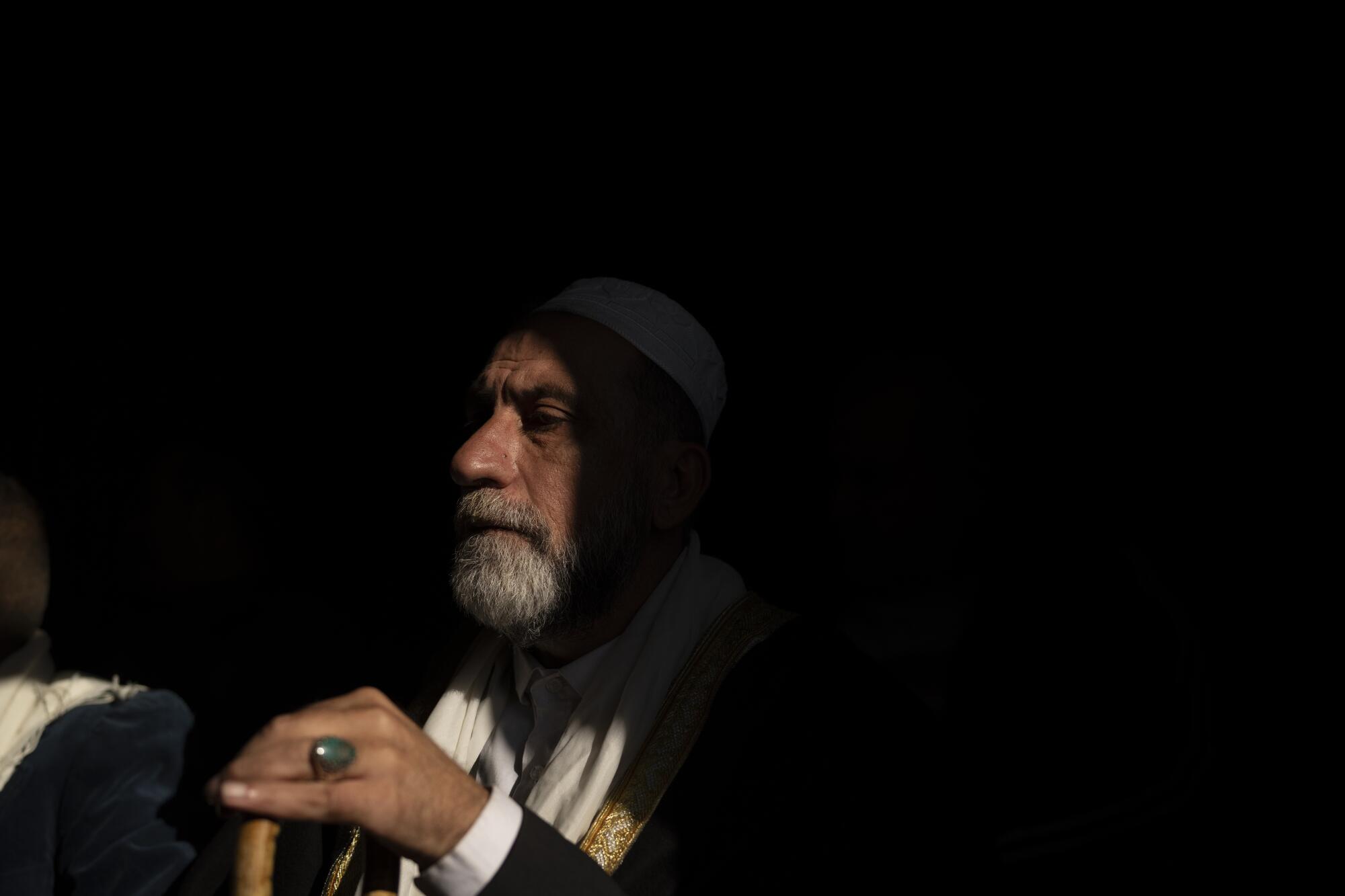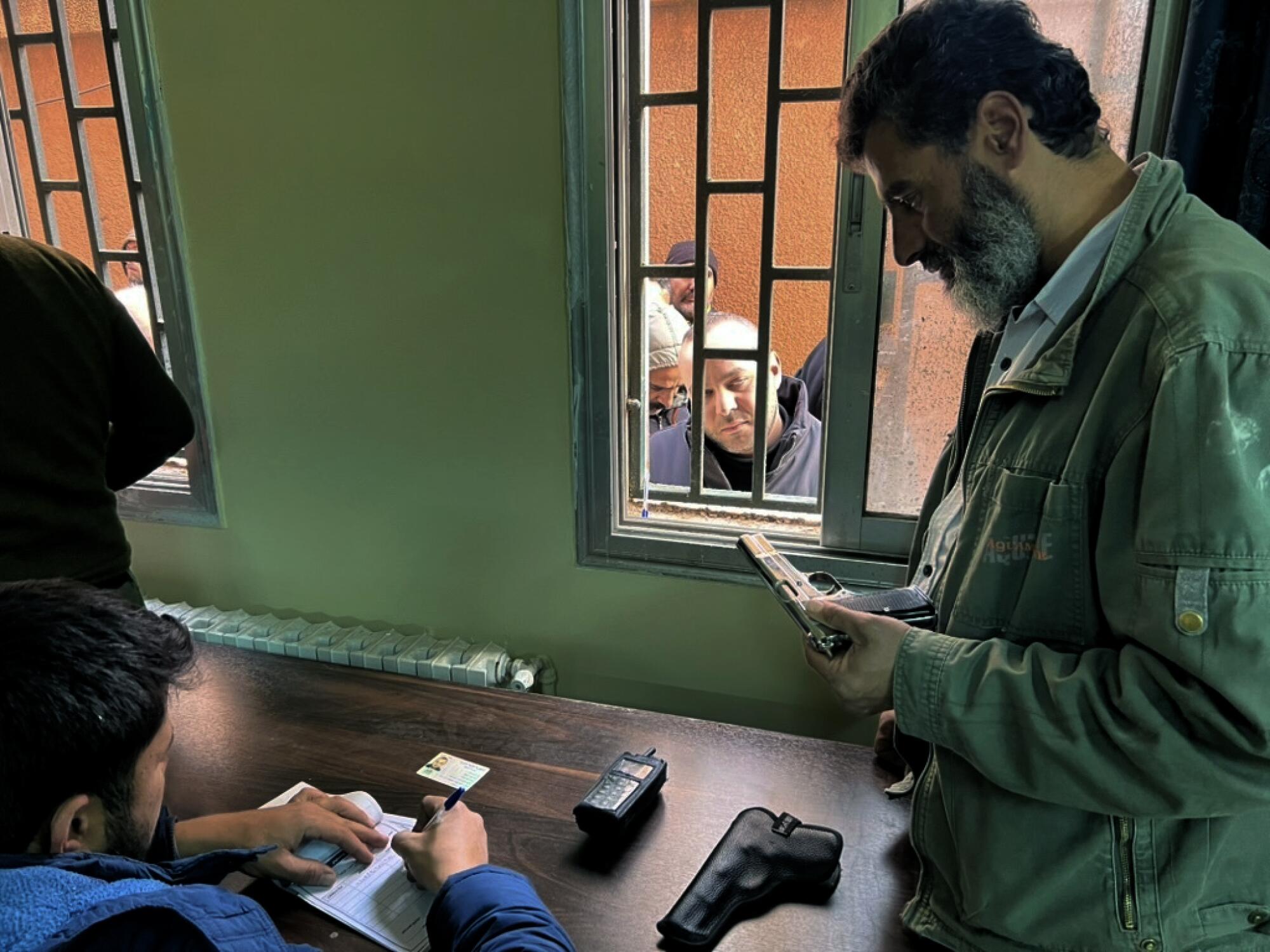
DEIR SHMAYEL, Syria — In the mountains east of Syria’s Mediterranean coast, armed patrols root out Assad loyalists, masked gunmen monitor checkpoints and residents fret every strange face could be an informer.
“See those guys over there? I think they’re watching me,” said Alaa Al-Rahy, watching from his balcony a trio of workers tending to a neighboring garden.
Al-Rahy, a landscape worker and Alawite activist, was repairing damage in his brother’s house in this village after it was looted in the days after Syrian President Bashar Assad’s ouster. There was little sign of chaos now, but Al-Rahy still seemed ill at ease. There had been arrests of several Alawite activists in the area, he said, and he didn’t trust the checkpoints on either end of the hamlet to stop vigilantes. “Any moment they can come for you,” he said.

A man looks at produce for sale in front of a Syrian government tank that was abandoned on a street in an Alawite neighborhood in Homs on Dec. 26, 2024.
(Leo Correa / Associated Press)
Assad’s fall sparked joy for many Syrians, but it also triggered wariness from his religious sect, the Alawites, a Shiite offshoot that makes up around 10% of the population. Alawites served as the backbone of the former government’s military and intelligence command, but as a new Syria takes shape, the country’s largest minority group is struggling with its association and past support for the hated dictator.
Alawites have become a community besieged, set to be excluded — if not persecuted — by the Sunni political class now in ascendance. It represents a stunning fall for a sect that for more than five decades stood at the apex of Syria’s ruling class and its ruthless security services.
Many Syrians blame Alawites for actively participating in the atrocities of the Assad government, seeing them as the face of a war machine that resulted in the killings and torture of hundreds of thousands of people.
Alawites now whisper of vigilante attacks and neighbors forced to flee their homes at gunpoint. Across social media, activist groups have cropped up claiming to document sectarian score-settling — kidnappings, killings, expulsions, robberies — which they fear were perpetrated by factions working with the new ruling authorities.
The Syrian Observatory for Human Rights, a monitoring group established during the war that documents violations, counted 137 revenge killings since the beginning of the year, most of them in provinces with Alawites.

Children check out an abandoned Syrian government tank in the Alawite neighborhood of Homs on Dec. 26, 2024.
(Leo Correa / Associated Press)
Hayat Tahrir al Sham, the Islamist group that now rules the country, has vowed to protect Alawites and other minorities. They insist that incidents targeting Alawites are not a matter of official policy but the fault of undisciplined individuals or factions, and that the interim government would punish perpetrators. Still, critics say there’s little accountability, with victims left in limbo between the kaleidoscope of jihadi groups working with the new government and Hayat Tahrir al Sham’s inability to police everywhere.
“The problem is that everyone speaks in the name of the Hayat, but when someone comes to your house or arrests you, there’s no way to verify their identity,” said Ghadeer Al-Khayer, an Alawite who works for the Health Ministry.
Al-Khayer, a jovial man with an earnest voice, lives in Qardaha, the Assad family’s ancestral town that is also home to the mausoleum of the ousted president’s precedessor and father, Hafez. In recent weeks, Al-Khayer has watched bands of fighters periodically descend on the mausoleum for a bout of vandalism; the building’s walls now stand defaced with graffiti cursing Hafez Assad’s soul and a bevy of revolutionary slogans. The interior shows signs of scorching; the coffin is nowhere to be found.
As a community leader here, Al-Khayer has taken a conciliatory approach toward the new Islamist administration. He curses Assad as freely as any rebel, dismissing the former dictator as an incompetent coward who entangled his fellow Alawites in war crimes before abandoning them. He rejects the sectarian lens that he says unfairly painted Alawites as being the sole or primary beneficiaries of Assad’s rule.
“There was an Assad sect; it included Sunnis, Alawites, Christians and Druze. Those were the ones benefiting,” he said.

Alawite religious leader Sheikh Deeb Dayoub takes part in a community meeting in Qardaha, Syria, on Dec. 17, 2024, to discuss local issues after the fall of President Bashar Assad’s government.
(Leo Correa / Associated Press)
Al-Khayer pointed out most Alawites were crushingly poor, with public or military service the only path to financial security open to them. And Alawites at times faced their own attacks and persecution as a minority, particularly by Sunni jihadi rebels.
Although the new government seems willing to listen to Alawite concerns, there’s a lingering resentment, with many pointing to the community’s complicity in torture and war crimes — whether in the security services or gangs of thugs known as the shabiha — over the 14 years of the conflict.
“The things that the people of this area did to us Sunnis, it would make you cry,” said Abu Stayf, a 37-year-old member of the Hayat Tahrir al Sham in Latakia, who gave his nom de guerre for reasons of security. He spoke of Alawite police officers in the past beheading Sunni victims in Idlib, his home province. “We should be stomping on their heads for what they did, but Allah is forgiving — and so are we.”

The reconciliation center in Jableh, Syria, where people may turn in their weapons and get temporary IDs, allowing them to move freely.
(Nabih Bulos / Los Angeles Times)
The interim government has promised amnesty to those who served in the Syrian army and opened up so-called reconciliation centers for enlisted soldiers and policemen to turn in their weapons. At the same time, it said it will hold accountable those implicated in “spilling Syrian blood.”
In Jableh, a mixed Alawite-Sunni city known as a bastion of Assad support, thousands of men shoved and pushed to line up before a government building. Once inside, they took a number, had their photograph taken and registered. After, they would hand over any arms or other military equipment in their care and receive a temporary card that would allow them free movement within the country until they can be investigated and called in again.
“Look, we’re treating them better than they ever treated us,” said Moaz Abu Ahmad, a 27-year-old clerk taking down soldiers’ information for the new authorities. A Sunni like himself, he added, would have swiftly received a bullet to the head in any of Assad’s gulags.
“But anyone involved in bloodshed and thuggery, those people will be held responsible — but in a legal way,” the clerk said.
Yet there is little clarity on what that means. A few weeks later, a prominent Alawite general involved in the defense of Aleppo city — and who asked to remain anonymous for fear of reprisals — went to the Jableh reconciliation center.

Syrians relinquish their military equipment and weapons and register for IDs at the reconciliation center in Jableh, Syria.
(Nabih Bulos / Los Angeles Times)
He was treated well, he said, but when he and other officers went back weeks later to claim an identity card, they were told to await instructions. He has gone into hiding, limiting contact with his family and moving frequently from one friend’s couch to another.
“I don’t have a passport or ID. I can’t move around. All us officers feels lost. We just have no idea what they’ll do to us,” he said. He added no one in the military establishment was receiving salaries, including retired veterans. “For many people here it means going hungry, ” he said.
Hayat Tahrir al Sham has run dragnets to pick up those unwilling to surrender. Authorities arrested almost 2,000 people in Homs city in a five-day campaign this month targeting “criminals who have harmed the Syrian people for 13 years and had not handed over their weapons in [reconciliation] centers,” according to a government statement.
“A number of suspects were arrested, and we transferred those proved to have committed crimes to the judiciary and released a number of others,” it said.
Some Alawites justify keeping weapons for protection, especially with Hayat Tahrir al Sham suffering from manpower shortages that force it to rely on more extreme groups within its coalition. The new rulers have also refused to arm trusted Alawites to defend their own areas.

Those working for the new authorities in Syria photograph people who come into the center in Jableh to register for IDs.
(Nabih Bulos / Los Angeles Times)
With unrest spiking and Assad-era security personnel sidelined, many fear a repeat of the Iraq scenario, when U.S. officials’ mass removal of military personnel after the invasion of Iraq sparked an armed insurgency.
There are signs it may already have begun. On Wednesday, gunmen attacked a checkpoint near Jableh, killing two members of the new government’s security force. A group calling itself the Popular Syrian Resistance, which rejects the new government, has claimed dozens of attacks, including assassinations of Hayat Tahrir al Sham members and ambushes of security convoys.
The insecurity has pushed many Alawites to conclude that the best solution is a full-scale secession of their areas into a separate territory, and to place it under the custodianship of a Western country, such as France.
“If the state protects us, we have no problem with them. But that’s not happening,” Al-Rahy, the Alawite activist, said. “These people are slaughtering us in the middle of our homes. We’re already divided — so let’s just have division.”






